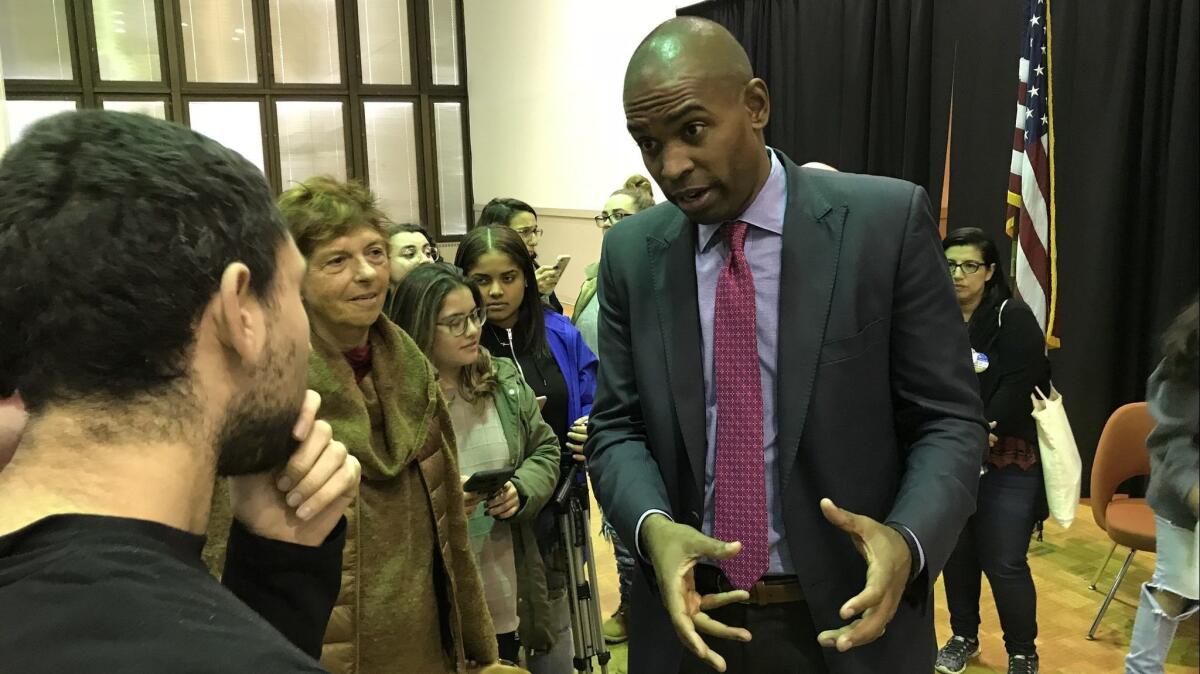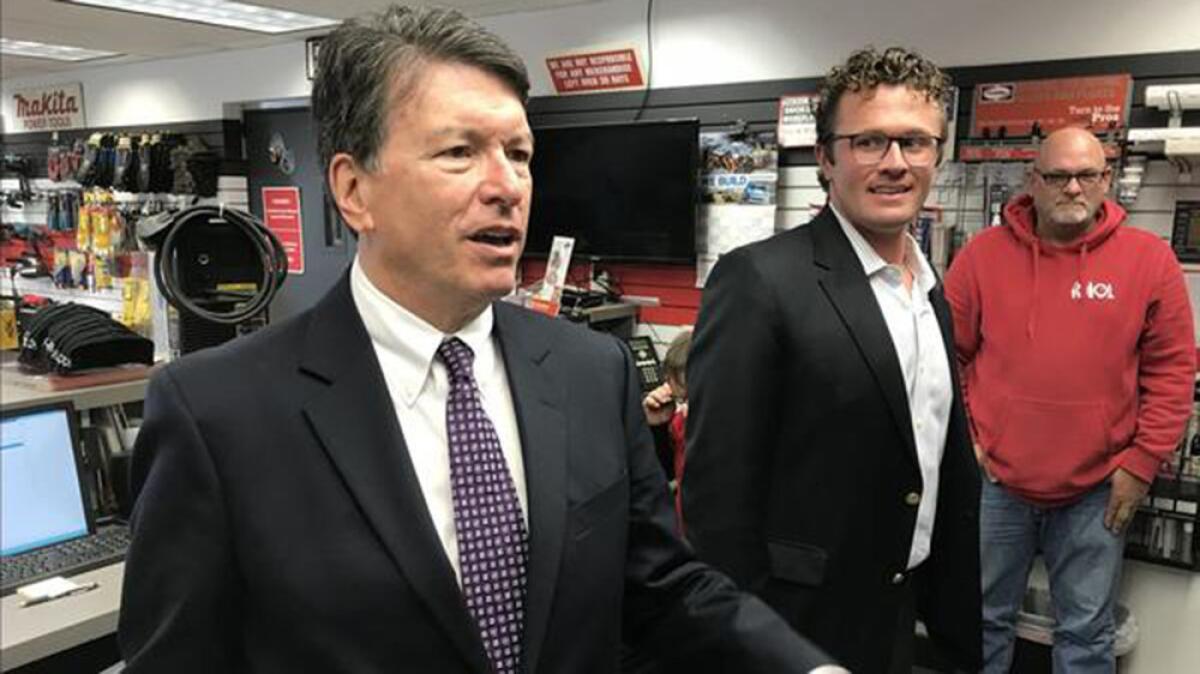Republican campaign money stretched thin as the party battles on unexpected fronts

- Share via
Reporting from Kingston, N.Y. — Reactionary culture warrior is not an image that has typically been associated with Rep. John Faso, an understated Chamber of Commerce favorite who represents an expansive district in an economically struggling part of upstate New York.
He’s the kind of Republican who met President Trump’s recent enthusiastic endorsement tweet with ambivalence. “I didn’t know it was coming,” he said. “You know, it is what it is.”
In politics, though, desperate times call for desperate marketing. National Republican groups not only have gotten Faso a Trump endorsement, they’ve surrounded him with a Trump-style campaign. They’ve poured millions of dollars into re-branding the endangered incumbent as part of a thin red line separating this mostly white, working-class region from the urban chaos they warn would be unleashed by his black opponent, who earlier in his life wrote wonky rap songs. (The ads don’t mention Democrat Antonio Delgado’s Harvard Law School degree or Rhodes scholarship.)
So far, the Republican side has spent about $10.4 million. It may not be enough.
In districts across the country, Republicans find themselves in an unusual position this year — unable to match Democratic spending. The energy of the left has given many Democratic challengers a crushing fundraising advantage, putting Republicans on the defensive in an unexpectedly large share of the political map.
With their resources stretched, conservative political groups in many races have turned up the temperature on their attacks, gambling that will give their ad dollars more impact. In New York’s Hudson Valley, however, the ads have fanned racial tension without doing much provably good for Faso.
“The Democrat has strengthened his standing in this race,” Patrick Murray, director of the Monmouth University Polling Institute, said Tuesday as he released a new poll showing Delgado 5 percentage points ahead. “These attacks haven’t changed the overall trajectory of this race.”
The Republicans are not impoverished by any means. But this deep into the election cycle, they can typically boast financial superiority as corporations and big donors, including the Koch brothers network and casino magnate Sheldon Adelson, fill campaign coffers.
This year, however, especially in races for the House, Democrats have eclipsed the GOP in small donations and have also gone toe to toe with them in big cash infusions from dark-money donors and political action committees.

Former New York Mayor Michael R. Bloomberg, for example, recently poured $9.5 million into campaigns to support two Democratic candidates in Southern California, part of $43 million he gave Democratic super PACs this month.
Hidden big money “is not just the realm of the right anymore,” said Sarah Bryner, research director at the Center for Responsive Politics, a campaign finance watchdog.
The jump in overall giving since the last midterm election is the biggest the nation has seen in 20 years, according to the center. Donors to Democratic candidates so far have contributed 44% more than they did in the last midterm cycle. That’s more than double the increase among donors to Republican candidates.
Some groups of Democratic donors have accelerated their giving way beyond that. Women are giving to Democrats at more than triple the rate they did in the last midterm election, according to the center.
“Females have increased the amount they are giving this cycle dramatically,” Bryner said. “It is just staggering.”
Republicans have seen no comparable surge from female donors.
The progressive online fundraising platform ActBlue, which allows small donors to click on a button to swiftly and seamlessly respond to candidate pitches for $20 here or $50 there, is swelling with cash. It already has reported raising nearly double what it did during the 2016 presidential cycle, when ActBlue propelled the astonishing fundraising success of Sen. Bernie Sanders.
Nearly two-thirds of ActBlue’s 4.7 million donors this cycle had never before given to a campaign. On one single day, Sept. 30, 310,000 donations were made on the platform, the most ever.
That’s all made campaigning exceedingly difficult for incumbent Republicans like Faso, as he tries to hang onto New York’s 19th Congressional District, which stretches into 11 counties from the bohemian enclaves of New Paltz and Kingston through an expanse of more rural, conservative communities north toward Albany.
Delgado, who only a year ago returned from the New York City area, where he worked at a large corporate law firm, to his childhood home upstate, has succeeded in wiping out the incumbent’s advantage by raising more than $6 million from individuals as Faso struggled to clear $2 million. Delgado logged 11,400 donations, five times as many as the incumbent. He’s on track to spend more than $13 million.
“Running during this time is very special,” Delgado said. “There is an outpouring of support. If you lean into it and do the work, you can get where we were able to.” He had just stepped down from a stage he shared with former Vice President Joe Biden, who parachuted into Kingston to campaign for the Democrat. An endorsement from Barack Obama came earlier.
Liberal outside groups like Rep. Nancy Pelosi’s House Majority PAC and End Citizens United, which advocates campaign finance reform, have poured millions into the race to bolster Delgado. But their spending doesn’t dwarf that of the candidate.
On the Republican side, Faso has less control of the message: His own campaign spending has been swamped, 3 to 1, by money controlled by outside Republican groups, chiefly House Speaker Paul D. Ryan’s Congressional Leadership Fund and the National Republican Congressional Committee.
Delgado has used much the same playbook as most other swing-district Democrats this cycle. He pounds relentlessly on Faso’s vote in the House to repeal Obamacare. Over and over, he contrasts Faso’s vote to repeal Obamacare with a vow the incumbent made to a constituent with cancer that he would preserve coverage for preexisting conditions.
“His ads are saying I want to basically toss old ladies off the cliff and take away everyone’s healthcare,” said Faso, arguing that his healthcare votes have been mischaracterized. Faso frames his opposition to Obamacare as common sense in a district with so many small employers. He talks of businesses laying off workers or not hiring new ones so they can keep their payroll below 50 employees, a cutoff for federal health coverage mandates.
Faso’s description of himself as a centrist is at least partially backed by the nonpartisan Lugar Center, a Washington think tank that ranks the congressman as the 18th most bipartisan House member in an index it publishes with the public policy school at Georgetown University.
But the campaign being run on his behalf is not exactly moderate. Most of the messages voters see and hear are crafted by Washington operatives who can’t legally coordinate with Faso. They are fixated on rap songs the 41-year-old Delgado wrote 10 years ago that are barely racy enough to merit a PG-13 rating.
“Nobody talks like that around here, it’s offensive,” growls a middle-age white male in an ad released a few days ago by the National Republican Congressional Committee. Earlier ads branded the Democrat “Big City Rapper Antonio Delgado.” An album cover featuring Delgado in a hoodie has become a regular presence on televisions in this district.
Faso defends the ads. “Since he has no record here, I think it is fair to say ‘do the provocative words that he authored on political topics reflect his views today?’” he said.
Delgado focuses on their racial overtones. “It is nasty,” he said. “It is ugly. It is divisive.”
And voters in this swing district, where support for Trump remains relatively strong, more often say they identify with Delgado’s values than Faso’s, according to the Monmouth poll. Healthcare is the issue they say concerns them most.
And now the rap ads have become one of the first things Delgado mentions at campaign appearances. It turns out they make a good icebreaker.
“I’ve had a couple of little careers,” the candidate told the crowd before Biden took the stage in Kingston. “I know you’ve heard of one of them.”
The latest look at the Trump administration and the rest of Washington »
More stories from Evan Halper »
evan.halper@latimes.com | Twitter: @evanhalper
More to Read
Get the L.A. Times Politics newsletter
Deeply reported insights into legislation, politics and policy from Sacramento, Washington and beyond. In your inbox twice per week.
You may occasionally receive promotional content from the Los Angeles Times.












